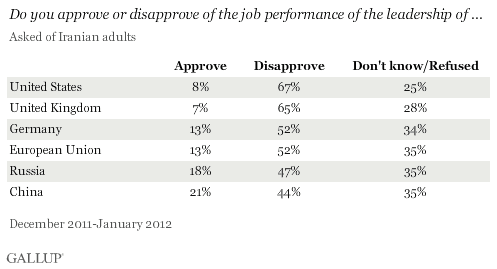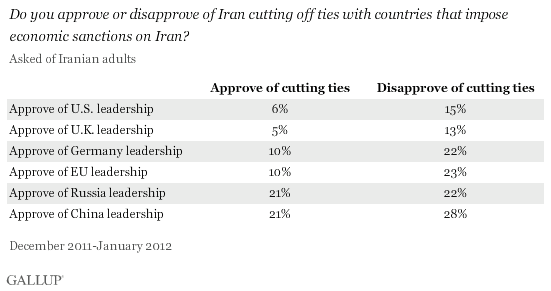This article is part of a series of U.S. Foreign Policy Opinion Briefings aimed at helping to inform U.S. leaders on pressing foreign policy issues.
Quick Summary: Iranians' already low approval of U.S. leadership did not get worse after the U.S. toughened sanctions in late 2011. Eight percent of Iranians approved of U.S. leadership in late 2011 and early 2012 -- one of the lowest ratings the U.S. receives worldwide. While nearly half of Iranians (46%) support cutting ties with countries that impose economic sanctions on Iran, nearly one in three (31%) do not, showing a sizable minority of Iranians still value relations.
Issue at Hand: The U.S., the U.K., and the EU in recent months have imposed some of the toughest economic sanctions on Iran yet to thwart its nuclear program. Iran has responded with threats to close the Strait of Hormuz, the route for one-fifth of the world's oil. Supreme Leader Ayatollah Ali Khamenei said on state TV last week that, "no obstacles can stop Iran's nuclear work."
Tensions over Iran's disputed nuclear program escalated further last week after Iran refused to allow International Atomic Energy Agency (IAEA) officials to investigate nuclear activities at a military base. The IAEA reported after its recent trip that Iran had stepped up its uranium enrichment, sending oil prices soaring to a nine-month high Friday amid concerns about a confrontation with the West.
The U.S. and Israel are not ruling out strikes against Iran's nuclear facilities, but the U.S. is urging Israel to give the sanctions additional time to work. Iran is anticipated to be the focus when Israeli Prime Minister Benjamin Netanyahu meets with President Barack Obama next week.
Obama Administration's Stance: Calling Tehran's refusal to give IAEA officials access to the military site "disappointing," U.S. State Department spokesman Mark Toner said last week that the U.S. still wants to see negotiations move forward. "There is that diplomatic track," Toner said. "But we're not going to ease up on the sanctions."
Although the administration has not taken any options off the table to prevent Iran from getting a nuclear weapon, Obama said in his State of the Union address that he believed that a peaceful resolution is still possible, and, if Iran abides by its international obligations, it can "rejoin the community of nations."
Iranians' Approval of U.S. and Other Key Players: The 8% of Iranians who approved of U.S. leadership in late 2011 and early 2012 is similar to the 9% measured in early 2011, and remains one of the lowest ratings the U.S. receives worldwide. Other countries that are tightening sanctions, such as the U.K., Germany, and the EU, also have few admirers in Iran. Seven percent of Iranians approve of the U.K.'s leadership, while slightly more approve of the leadership of Germany (13%) and the EU in general (13%).

Russia and China, which have criticized the West's sanctions, fare better. Roughly one in five Iranians approve of each country's leadership. However, Iranians are still more likely to disapprove than approve of the leadership of these key major powers.
While nearly half of Iranians (46%) support cutting ties to countries that impose economic sanctions, nearly one in three (31%) do not. This suggests that a sizable minority of the Iranian public still sees value in pursuing a diplomatic track. Approval is still low among Iranians who do not support cutting ties with these nations, but these Iranians are significantly more likely to approve of the U.S. than those who believe ties should be severed.

In addition, 65% of Iranians believe that the sanctions the U.S., the U.K., and the EU recently imposed will personally hurt them a "great deal" or "somewhat." This is despite U.S. assurances that Iran, not its people, are the sanctions' main targets. The value of the Iranian rial has dropped sharply in recent weeks, and prices of food, consumer goods, and utilities have spiraled. Almost half of Iranians (48%) now say there were times in the past year when they did not have enough money to buy food their families needed.
Policy Implications: Even if diplomatic efforts succeed, the U.S. and other Western nations will still face the challenge of finding a way to engage an Iranian public that has suffered under the economic sanctions. Iranians' approval of the U.S. and other key powers is almost incapable of sinking any lower. Despite the expected personal costs, nearly one-third do not endorse cutting ties. This suggests some Iranians still hold out hope for some type of relationship -- even if it falls short of the formal diplomatic ties with the U.S. that Obama pursued early in his presidency.
For complete data sets or custom research from the more than 150 countries Gallup continually surveys, please contact SocialandEconomicAnalysis@gallup.com or call 202.715.3030.
Survey Methods
Results are based on landline telephone interviews conducted from a telephone center outside Iran with approximately 1,000 adults, aged 15 and older, conducted Dec. 16, 2011-Jan. 10, 2012, in Iran. For results based on the total sample of national adults, one can say with 95% confidence that the maximum margin of sampling error is ±3.8 percentage points.
The margin of error reflects the influence of data weighting. In addition to sampling error, question wording and practical difficulties in conducting surveys can introduce error or bias into the findings of public opinion polls.
For more complete methodology and specific survey dates, please review Gallup's Country Data Set details.
